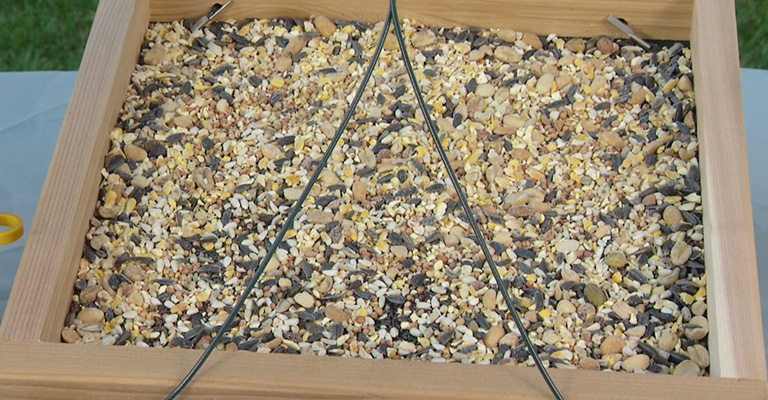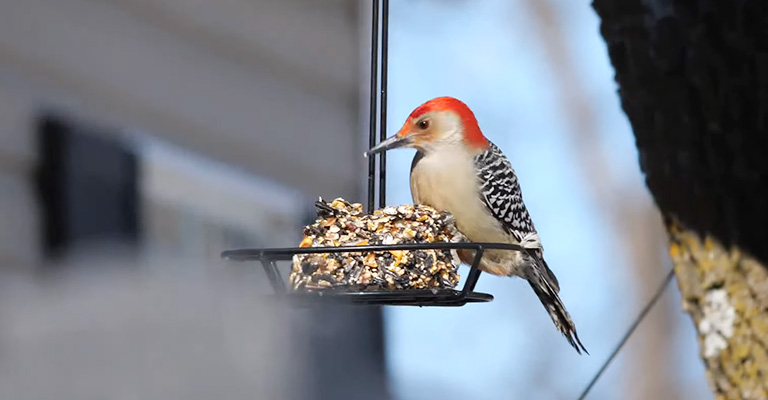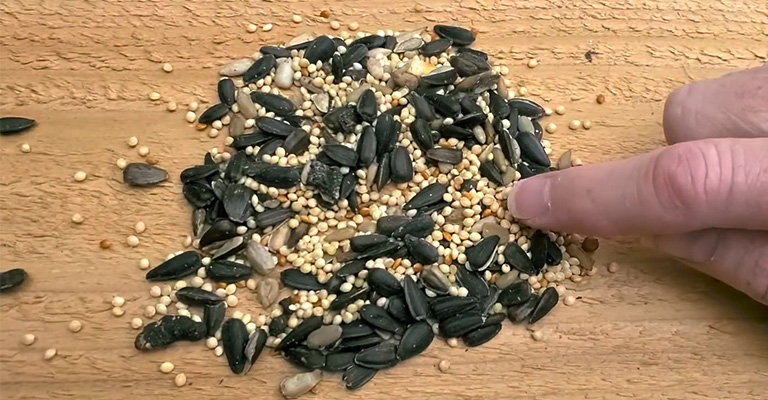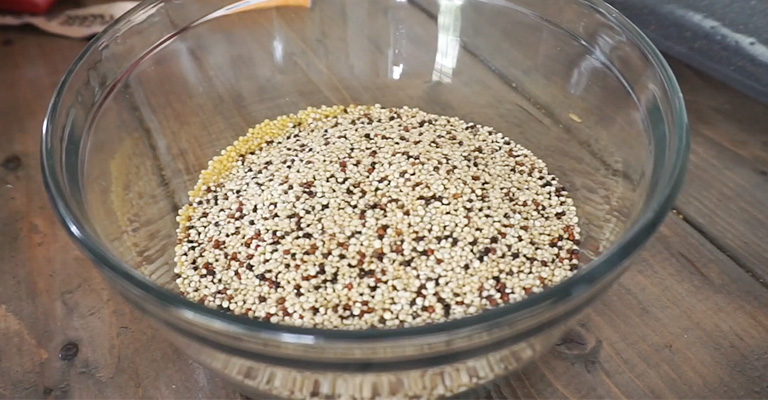As you stroll down the aisles of a pet store or garden center, the price tags on bags of bird seed might prompt a curious question: Why is bird seed so expensive?
The seemingly straightforward mix of grains and seeds comes with a price tag that might raise eyebrows.
Behind the cost lies a complex interplay of factors, from sourcing and processing to quality and demand.
Understanding the reasons behind the seemingly high price of bird seed unveils a narrative of supply chains, nutritional quality, and the economics of catering to both human and avian needs.

Why Is Bird Seed So Expensive? [9 Reasons]
Bird seed is so expensive because of various factors that affect the supply and demand of the seeds and grains that are used to feed birds.
Here are nine reasons why birdseed is so expensive:
Quality and Variety
Premium birdseed blends often include high-quality ingredients like sunflower seeds, nuts, and fruits. The cost of sourcing and including diverse, nutritious components contributes to the overall expense.
Harvesting and Processing
The production process involves cleaning, sorting, and packaging seeds, which adds to the labor and machinery costs.
The careful handling and processing of seeds to ensure they are free of contaminants can increase the price.
Imported Ingredients
Some ingredients, like specific seeds or fruits, might need to be imported from specific regions, leading to higher transportation costs and potential fluctuations in currency exchange rates.
Supply and Demand
High demand during certain seasons, such as winter when birds rely on feeders, can lead to increased prices due to limited supply.
Manufacturers might adjust prices to match the demand.
Packaging and Branding
Attractive packaging and branding can contribute to costs. Companies invest in visually appealing packaging to stand out in the market, which can influence pricing.
Preservatives and Additives
Some seed blends include additives to extend shelf life and preserve freshness. These additives, if they are of high quality, can increase the cost of production.
Ethical Sourcing
Brands that prioritize sustainable and ethically sourced ingredients might have higher production costs due to the practices they adhere to, such as fair trade certifications or environmentally friendly harvesting methods.
Regulations and Testing
Birdseed must meet certain quality and safety standards. Regular testing and adherence to regulations can incur additional costs that are reflected in the final price.
Specialty Blends
Certain bird seed blends are designed to attract specific bird species, such as finches or hummingbirds. The research and development that go into creating these specialized blends can contribute to higher costs.
The expense of bird seed is influenced by factors ranging from ingredient quality and variety to processing, packaging, and ethical considerations.
The intricate balance of these elements results in the final price tag, reflecting the effort and resources invested in providing nutritious and attractive options for our feathered friends.
Is It Ok To Eat Bird Seeds?

Eating bird seeds is not recommended for humans, as it may have some health risks and drawbacks.
Here are some reasons why you should avoid eating bird seeds:
Bird Seeds May Be Contaminated With Bacteria Or Fungi:
Bird seeds may contain harmful bacteria, such as salmonella or E. coli, or fungi, such as mold or aflatoxin, that can cause food poisoning, infections, or allergies in humans.
Bird seeds may also be exposed to dirt, dust, insects, rodents, or bird droppings that can carry diseases.
Bird Seeds May Have Pesticides Or Herbicides:
Bird seeds are often grown in fields that are treated with chemicals to control pests and weeds. These chemicals may remain on the seeds and pose a risk to human health if ingested.
Some of these chemicals may be carcinogenic, neurotoxic, or endocrine-disrupting. Bird seeds may also be sprayed with preservatives or additives that are not safe for human consumption.
Bird Seeds May Not Be Nutritious Or Digestible For Humans:
Bird seeds are designed to meet the nutritional needs of birds, not humans. They may have different amounts of protein, fat, carbohydrates, vitamins, minerals, and fiber than what humans require.
Some bird seeds may also contain ingredients that are not suitable for human diets, such as animal by-products, artificial colors, or fillers.
Bird seeds may also be hard to digest for humans, as they have tough shells or husks that can cause stomach upset or intestinal blockage.
These are some of the reasons why eating bird seeds is not a good idea for humans. If you want to eat seeds as a snack or a supplement, you should buy them from a health food store or a supermarket that sells human-grade seeds.
These seeds are usually cleaner, safer, and more nutritious than bird seeds. You should also wash them thoroughly before eating them and store them in a cool and dry place.
What Is The Best Inexpensive Birdseed?

The best inexpensive bird seed depends on what kind of birds you want to attract and what kind of budget you have.
Different birds have different preferences and needs, and different seeds have different prices and qualities.
Here are some general tips to help you choose the best inexpensive bird seed:
Buy In Bulk
Buying bird seed in bulk can save you money in the long run, as you can get more quantity for a lower price per unit.
You can buy bulk bird seeds online or from local stores that sell bird supplies. However, you should also consider the storage and freshness of the bird seed, as it can spoil or attract pests if not stored properly.
Choose Seeds That Are Popular With Many Birds
Some seeds, such as sunflower seeds, safflower seeds, and millet, are widely enjoyed by many types of birds, such as cardinals, finches, sparrows, and jays.
These seeds are also relatively cheap and easy to find. You can mix these seeds together or offer them separately to attract a variety of birds to your yard.
Avoid Seeds That Are Wasteful Or Unwanted:
Some seeds, such as corn, wheat, oats, and sorghum, are often filler ingredients that are added to lower the cost of birdseed mixes.
However, these seeds are usually ignored or discarded by most birds, as they are not nutritious or appealing to them. These seeds can also create a mess in your yard or attract unwanted visitors such as rodents or starlings.
Consider Your Local Climate And Season
Some seeds may be more suitable for certain climates and seasons than others. For example, in cold or dry regions, you may want to offer seeds that are high in fat and oil, such as sunflower seeds, peanuts, or suet cakes.
These seeds can provide more energy and warmth for the birds. In warm or wet regions, you may want to offer seeds that are low in moisture and mold-resistant, such as nyjer seeds, safflower seeds, or hulled sunflower seeds.
These seeds can prevent spoilage and disease for the birds.
What Are Some Alternatives To Bird Seed?

Some alternatives of bird seed that you can feed to your backyard birds are:
Fruits And Vegetables
Many birds enjoy eating fruits such as apples, grapes, oranges, bananas, berries, and melons. You can also offer them vegetable seeds, such as pumpkin and squash seeds, or cooked peas, corn, and potatoes.
Make sure to chop the fruits and vegetables into small pieces and avoid any moldy or spoiled food.
Baked Goods
You can feed birds stale or dry bread, crackers, cookies, cakes, donuts, and cereals. Choose whole grain products and avoid anything with sugar, salt, or chocolate.
You can also offer them uncooked pastry dough. Break the baked goods into small pieces and soak very dry ones in water before feeding them.
Cheese And Meat
Some birds like to eat cheese, especially hard cheese that is mild in flavor. You can also offer them bacon grease, cooked eggs, or meat scraps.
These foods are best fed in winter when they will not spoil easily and when birds need more fat and protein. Do not feed birds any rancid or moldy cheese or meat.
Pasta And Rice
Cooked plain pasta and rice are good sources of carbohydrates for birds. You can also feed them uncooked rice, which is not harmful to them as some people may think. Avoid any pasta or rice with sauces, spices, or cheese.
These are some of the kitchen scraps that you can use as birdseed alternatives. However, you should not rely on scraps alone to feed your backyard birds. They may not provide enough nutrition or variety for them.
You should also make sure to clean your feeders regularly and provide fresh water for the birds. Scraps can attract pests and predators, so be careful about how much and how often you offer them.
FAQ
Bird seed prices reflect factors like ingredient quality, processing, and packaging. Some bird seeds contain premium ingredients such as sunflower seeds, nuts, and fruits, increasing the cost compared to basic animal feeds.
Yes, attractive packaging and branding can contribute to the cost. Companies invest in eye-catching designs to stand out, impacting the final price of the product.
Yes, certain seeds or fruits used in birdseed blends might need to be imported, leading to higher transportation costs and currency fluctuations that affect pricing.
Yes, during peak seasons, like winter, when birds rely on feeders, demand increases, and this can influence prices due to limited supply.
Yes, options like sunflower hearts or cracked corn are often more affordable than elaborate seed blends. These simpler options still attract a range of birds without compromising on nutrition.
Conclusion
In unraveling the mystery of why birdseed commands a seemingly high price, we glimpse into the intricate web of factors that shape the market.
From the quality of ingredients and processing to packaging, transportation, and safety regulations, each component adds to the final cost.
As consumers, acknowledging these factors helps us appreciate the efforts involved in delivering a nutritious and safe product to our feathered friends.
While the cost might be a consideration, it’s also a reminder of the value we place on fostering a connection with nature and contributing to the well-being of the avian species that grace our lives with their presence.